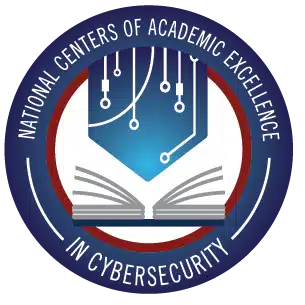Safeguard the digital world
Cybersecurity Degree
The cybersecurity degree program is designed for students who seek to defend against cyber threats in industry and public service. Join the front lines of cyber defense. Pursue a cybersecurity degree and make a global impact.
Future security experts are getting prepared right here.
Defend, protect, and innovate—join AU’s cybersecurity degree program and lead the charge against cyber threats.
The cybersecurity degree program is designed for students who seek to defend against cyber threats in industry and public service. Cybersecurity majors are trained to be the “good guys,” defending the public against today’s ever-present cyber attacks. Students learn about information assurance, server and network environments, cryptography, cyber-related public policy, and cyber warfare. Cybersecurity degree graduates pursue careers in industry for a wide variety of companies, in a security operations center, or in local, state, or federal government service.
Students who gravitate toward cybersecurity typically enjoy solving puzzles, digging down to find the root cause of a problem, and integrating information from many sources into a whole. Being detail-oriented is important, because sometimes the smallest breadcrumb is the key to cracking the case. Cybersecurity professionals want to make a difference in the world, protecting others and solving mysteries.
From hacking to protection, master new skills.
The cybersecurity degree program aims to help students develop a strong foundation of professional ethics based on a Christian faith perspective.
EXPLORE THE PROGRAM
Cybersecurity is an interdisciplinary program designed to produce graduates with not only the best technical skills but also a deep understanding of the national security landscape of attacks and excellent communication skills through a liberal arts education.
Program of Study
The B.A. in cybersecurity degree program is designed to meet the curricular learning outcomes for a validated program of study described by the National Security Agency (NSA). The core courses that fulfill those requirements are:
- Introduction to Cybersecurity (CPSC 2080)
- Scripting and Systems (CPSC 2180)
- System Administration (CPSC 2300)
- Public Policy (POSC 2200)
- Applied Cryptography & Security (CPSC 3380)
- Computer Networks (CPSC 3410)
- Network Security (CPSC 4080)
- Homeland Security (POSC 3350)
The cybersecurity degree program includes courses in computer science, political science, mathematics, and philosophy. Students are also required to pursue at least one cybersecurity certification, such as CompTIA Security+ or EC-Council’s Certified Ethical Hacker.
See the Security Studies section of the undergraduate catalog for additional information about the major.
Options
- Graduate with a BA in Cybersecurity in 3 or 4 years with the on-campus degree option.
- Graduate with a BA in Cybersecurity and an MBA with the 3+1 program. You’ll spend four years total in these on-campus degree programs at AU and earn two degrees while you’re here.
- Graduate with a cybersecurity degree in 4 years through our online cybersecurity option designed for adult learners, who are ages 23 and older. Request information for the online cyber option here.
AU National Security Fellows
Our program has amazing resources. The AU National Security Fellows program, established by President John Pistole, former deputy director of the FBI and former administrator of the TSA, provides our majors with a Beltway experience in Central Indiana, connecting students with leaders in the national security field.
Cyber Engineering Lab
The Cybersecurity Engineering Lab was established through the support of Ascension Technologies, Integration Partners, Extreme Networks, and Dell EMC. This facility allows students to gain hands-on experience with top-of-the-line servers, routers, and switches.
Speakers
Guest speakers provide a glimpse of industry and research to our undergraduate students. We bring in 5-6 guest speakers per semester in areas related to computer science and cybersecurity.
Career Outcomes
According to the Bureau of Labor Statistics, cybersecurity job growth is projected to be 28% between 2016-2026, much faster than the average for computer occupations (13%) or the average for all occupations (7%). The (ISC)² Cybersecurity Workforce Study states that there is a shortage of cybersecurity professionals of approximately three million globally, with nearly half a million openings in North America.
The Anderson You
You have unique interests and skills that set you apart. Explore the free My College Career Quiz to receive a personalized list of majors selected just for you. We’ve taken out the guessing work. Come find the Anderson you.

